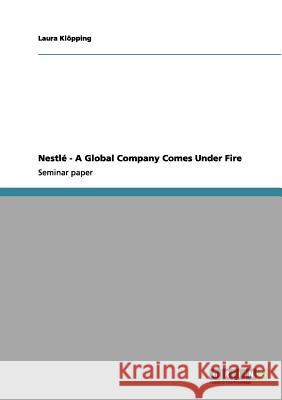Nestlé - A Global Company Comes Under Fire » książka
Nestlé - A Global Company Comes Under Fire
ISBN-13: 9783656135067 / Angielski / Miękka / 2012 / 56 str.
Seminar paper from the year 2011 in the subject Business economics - Economic Policy, grade: 1,3, Stralsund University of Applied Sciences, language: English, abstract: Nestle as a well-known and at the same time controversial company having a revenue of about 80 billion Euros, founded and headquartered in Vevey, Switzerland. Most of the people are not aware of it while consuming Nestle products and 95% of the Japanese think it is originated there. Many products are already consumed in the third generation. With 449 factories in 83 countries with 278,000 employees, which is an indicator for an unusual decentralization, Nestle is the largest food and beverage company in the world and the industry combine with the highest revenue in Switzerland and one of the 50 leading companies worldwide concerning revenue and number of employees. As a very global combine 28% of the food revenue comes from emerging countries in Latin America and Asia, 40% from Europe and 26% from the USA and Canada. Not only the size but also the globalization makes Nestle be different than all other competitors. Owning six main brands and about 8,500 national and regional brands it gets 70% of the revenue by selling brands that rank on the first or second place in each product segment. Nescafe, as one of the main brands, is the most consumed coffee brand in the world with 3,000 cups a second and Nesquik, Milo and Nescau make Nestle be number one in the chocolate and malt drink section. All in all Nestle is characterized by three important features: strong brands, high presence and a leading position in the markets.











